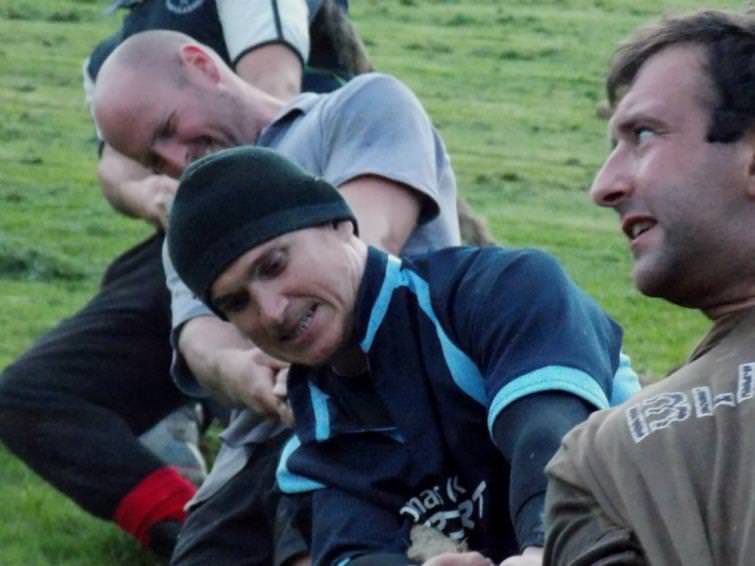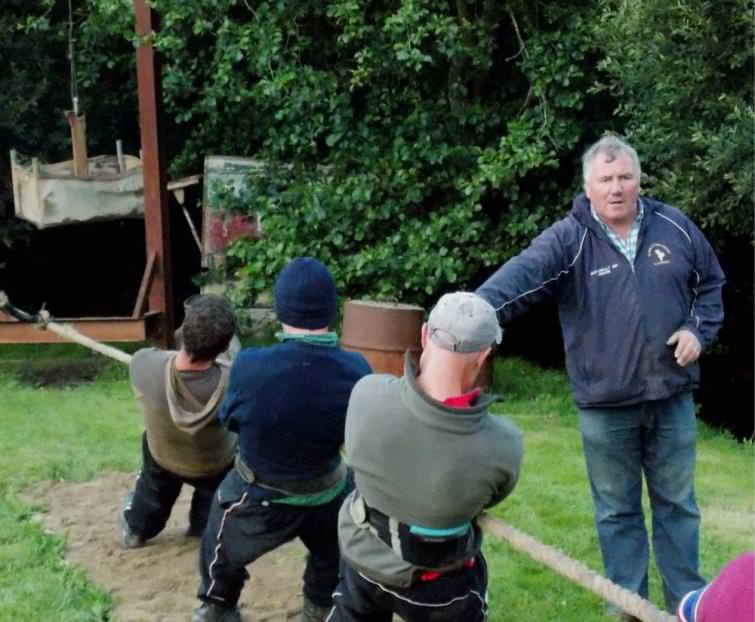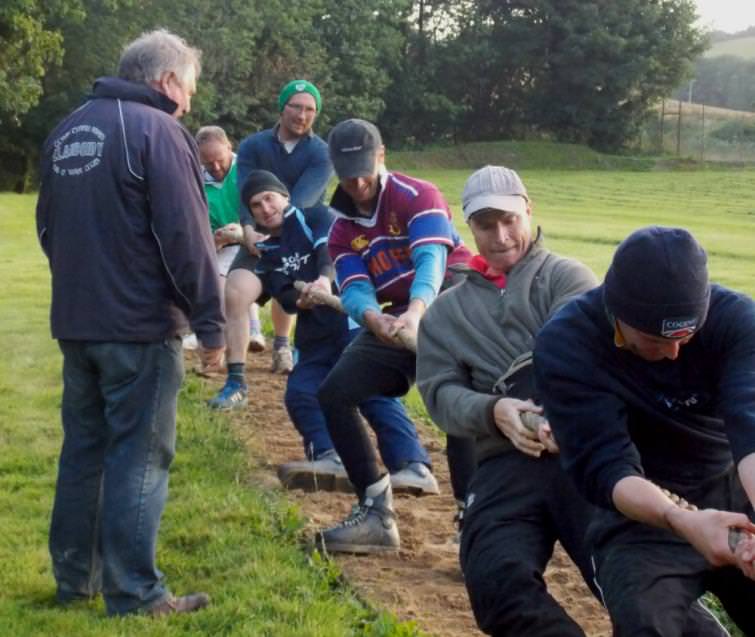Fraser finds tug of war very hard work

As I limped back to the changing rooms at Llanboidy Sports and Social Club, darkness descended; my forearms were burning, my hands were sore, my back was in bits – and my head, to put it mildly, was spinning.
And unsurprisingly so, as I had just completed my first ever late night tug of war session, and what’s more, it had been with the current Welsh champions.
Strong legacy is continued

Llanboidy’s legacy as one of the UK’s strongest teams was cemented long ago. Having formed in 1948, they were famously crowned World champions in 1977, and have won multiple Welsh and British titles in their 67-year existence. Earlier this summer, they became national champions at three levels – 640kg and under, 680, and 720.
At the time of my involvement, the team’s preparations for the UK Championships in Bedford were in full swing. This represented good and bad news – on the plus side, I knew I was going to get a real insight into the training that went on – yet on the downside, they weren’t about to go easy on a novice.
Speedy learning curve
The invitation came from Simon James, a friend of mine who has been involved with the team for 11 seasons, and on arrival, he confirmed to me what I already feared.
“You can be super fit and be able to run for miles – but that won’t necessarily help you in tug of war,” he explained.
“It’s all about grip strength. People often think that if they can bench press they’ll be good at this sport, but it doesn’t work like that.
“Leg strength is really important as well. You can’t be too big in your upper body.”
And to put into perspective the conditioning levels required to compete at the level Llanboidy do, as I arrived, some members were finishing off a six mile run. And that was their warm up.
“We do a lot of running, cycling, and work with tyres to keep our fitness up,” added Simon.
“One of our members, Nick Rees, is training for Iron Man Wales at the same time as training for tug of war.”
Dorian drives them on
Indeed, the team’s training schedule is gruelling, and they compete most weekends during the summer months.
And leading them is coach Dorian Phillips, a hard taskmaster also renowned for his work with Narberth RFC. Therefore, my previous connections with Whitland RFC, made me that little bit more nervous.
Dorian explained to me how the team needs to change members, and sometimes diets, to compete at different weight levels. With eight men in a side, saunas are often used to ensure competition boundaries are not crossed.
All ‘tacked up’ and ready to go
Prior to getting started, we plastered our hands with ‘tack’, a special mix of resin and petrol designed to improve grip on the rope. Little did I know how much I was about to need it.
Naively, I had also rocked up in trainers, unaware of the special boots required to improve stance and prevent slipping. Thankfully, Simon sorted me out a spare pair.
But regardless of attire, nothing could fully prepare me for what came next. Armed with a 35 metre rope, myself and other members combined to pull 800kg of weight up on a pulley. As we went back, the weight supposedly rose up.
Simon’s earlier emphasis on grip, an area that has long been a flaw of mine in sport, unnerved me because tennis, golf, and cricket are all activities I can claim to be competent in without ever coming close to excelling. In all three, my grip has been a major weakness.
Tough tasks begin
I was told the majority of tug of war teams tend to place the smaller people towards the front, with the rope’s distance from the floor steadily increasing en route to the bigger, heavier people towards the back. Needless to say, I was placed pretty far forward.
Sure enough, Dorian was soon altering my body position, instructing me to lean back further whilst bringing my lower body up towards the rope. What also struck me was how in sync with each other the rest were – timing their calling and movements so that they heaved as one.
And I soon realised there was more to this part of training than getting the weight to the top. Often, Dorian would instruct us to hold the 800kg (that was increased as the session went on) at a certain point. With my forearms on fire and my lower back feeling as if it was about to cave in, I found this particular part more difficult than most.
Indeed, my turn to ‘sit out’ could not come soon enough!
Strong team ethos
But what I was able to indulge in, was the obvious team ethos associated with tug of war. My crash course had already taught me there were no hiding places, and no room for individuals whose head was not in the game. The desire to not let down your teammates, even when pain levels were excruciating, means everything.
Furthermore, when someone did cave in, resulting in everyone being jolted forward as the weight crashed to the muddy surface, the outcome wasn’t pretty.
Of course, the club has not enjoyed the success it has without hard-edged training. Sure enough, if we failed to get the weight right to the top, even with the later increased load – Dorian’s response was simple, get back up and do it again.
Another indication of the work these guys do, is that at one point, a struggling team member apologised to Dorian for being slightly off the pace, having not done a training session since the previous Friday.
It was only Monday.
No relenting as dusk approaches
Then it was time to split the group in half, as two teams faced off against each other, with the rope wrapped around a post in a V-type formation. The battle of wills that typifies the sport was again evident here, with contests lasting several minutes as both side refused to cave in.
And if all this wasn’t enough, during breaks, some individuals used an old but expertly recycled milking parlour to execute pull ups, while others practiced sit ups – before we finished off with some tyre work.
Of course, there was little chance of a wind down in the fading light (we were now past 10pm). So with a rope attached, we dragged the tyre to all corners of the large Llanboidy field, with Dorian deciding to add his own weight to it when it appeared we were coping all too easily.
Needless to say, by the time we’d made it around, not only was I ready to stop, I was nigh on ready for bed.
Reflections on the evening
But as I made the long drive home to St Davids that night, with my hands sticking to the steering wheel following a poor attempt to wash off the ‘tack’ – three things in particular struck me.
The first was the simplicity behind the hard work. Tug of war is not a well-publicised sport blessed with riches and state of the art facilities. The pulley, the old milking parlour, the tyres, the rope, the weights – all recycled objects used to maximum effect.
The second was the sport itself is easy to underestimate. It is about considerably more than standing and delivering, or just yanking a rope has hard as you can – it’s about grip, strength, technique, power, desire, teamwork, and co-ordination. And all such qualities, are needed in abundance.
And thirdly, something re-iterated from the pain in the arms for the 48 hours that followed - Llanboidy tug of war team are not Welsh champions for nothing.
**Following this feature, Llanboidy secured a third placed finish in the 680kg and under section of the UK Championships, narrowly missing out on capturing the title they last won in 1981.
Two teams from each of the four British nations qualified for the event, and Llanboidy made the semi finals before going down to one of the English representatives, Lincoln.
But the Welsh side recovered to beat 2014 winners Bancran of Northern Ireland, to claim bronze.
The following day, in the open ‘Club Championships’ event, the club claimed silver medals after losing in the final.